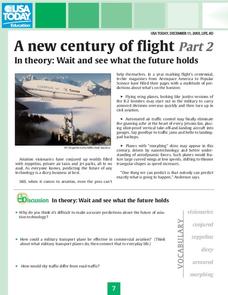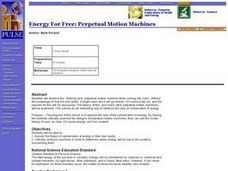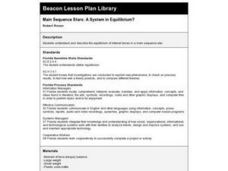Curated OER
Introduction to Computing and Project Development
Students use a computer and math to complete a science project. They review a brief history of computers as well as information on different operating formats will be included. In addition, students complete an overview of the hardware...
Curated OER
Golden Stars?
Students explore the possibility that all the gold on Earth came from another source. Discussions of how the materials arrived and its source forms the basis of data used to play a review game.
Curated OER
FOOTSTEPS IN TIME
Students measure and correlate their foot lengths and body heights, then use this data to estimate height of Laetoli hominids. They use metric measurement and graphing to determine these heights.
Curated OER
States of Consciousness
In this psychology instructional activity, students write short answers to 5 questions on states of consciousness. They list the different classes of recreational drugs and functions of sleep.
Curated OER
A New Century Of Flight
Students analyze an article about fight traffic and answer questions. In this investigative lesson students study flight and fill out a worksheet pertaining to the information that they just learned.
Curated OER
Gases
For this gases worksheet, students review the 3 states of matter, the types of molecular motion, and the characteristics of gases. This worksheet has 30 problems to solve.
Curated OER
How Does Climate Affect Your Environment?
Pupils access the Global Sun Temperature Project website and research the relationship between the location and climate of a participating school to its building structure. They consider how climate affects the type of structures humans...
Curated OER
Energy for Free: Perpetual Motion Machines
High schoolers observe the "drinking bird" perpetual motion machine and critically examine the designs of other so-called perpetual motion machines. They use this experience to create their own definition of conservation of energy.
Curated OER
Plants
Students plant bean seeds and draw pictures of the plants as they grow. They create their own garden, plant the seeds, and keep a journal of their growth.
Curated OER
Classifying Matter Game
Students identify the different states of matter. In this chemistry lesson plan, students differentiate the physical properties of the three states. They apply what they learned by playing a team game at the end of the lesson plan.
Curated OER
Ya' Gotta Have Heart
Fourth graders study the parts of the human circulatory system and how they function. They design a flow chart of the circulatory system and use data to construct charts and graphs.
Curated OER
Zigzag Seeds
Students observe the effects of gravity on seeds. Students place seeds in various orientations and record their growth to determine how gravity affects the seeds' growth.
Curated OER
Sensation and Perception
For this psychology worksheet, students complete a 5 short answer quiz on sensation and perception. They explain how the five body senses are used to collect information about the environment.
Curated OER
NOAA Research Project
Students research any topic relating to the National Oceanic and Atmospheric Administration (NOAA) research cruise that Mrs. Richards be participating in.
Curated OER
Cell Structure and Function
Students compare the organelles present in plant and animal cells. In this biology lesson, students create an analogy to easily remember their assigned organelles. They also research their function and write a creative story.
Curated OER
To Sleep, Perchance to Dream
Students examine their thoughts on the origin and meaning of dreams on a personal basis. They compare and contrast different models of the nature of dreams. They maintain a dream journal over a specific period of time.
Curated OER
An Ad for an Element
Students prepare an ad for an element, including properties and uses, in an attention getting format such as that used in the advertising business.
Curated OER
Using Adjectives to Describe Observations
Seventh graders write observations of organisms based on both audio and video sources. They describe organisms which they view using appropriate adjectives.
Curated OER
Who's for Dinner?
Fifth graders examine life systems within different biomes. They choose paper plates with the names of animals on them. They research the animals, write reports and draw pictures of them. They create a food chain model by arranging the...
Curated OER
Main Sequence Stars: A System in Equilibrium?
Fourth graders study the equilibrium of internal forces in a main sequence star.
Curated OER
#22 Frames of Reference: The Basics
Students explore the concept of frames of reference in physics.
Curated OER
Frames of Reference: The Basics
Young scholars learn the concept of frames of reference in physics. They examine how two frames of reference, each moving with respect to the other with a constant velocity v (constant speed, constant direction).
Curated OER
Yeast Cells and Their Environment
Students create their own experiment in which they have yeast cells growing in liquid environments. They examine the relationship between humans and microorganisms. They also practice using the scientific method.
Curated OER
Environmental Education
Second graders examine how their choices affect the environment. They identify different types of pollution and its source. They ask questions to end the lesson.























